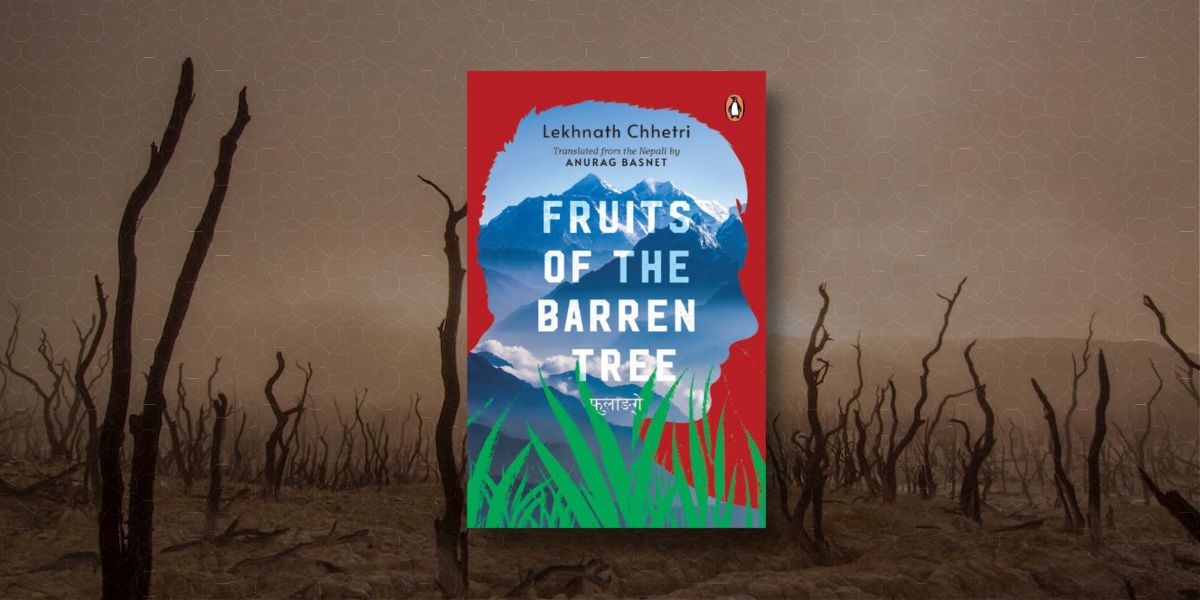
Written by Lekhnath Chhetri and translated by Anurag Basnet
Penguin Random House India is proud to publish the English translation of Phoolange, a highly praised novel originally written in Nepali by Darjeeling-based writer, poet, journalist, and social activist Lekhnath Chhetri. The English edition is titled Fruits of the Barren Tree and was translated by the eminent editor and translator Anurag Basnet. The book is scheduled to come out on 17th April, 2023 under the Vintage imprint and is currently available across all major e-commerce websites for pre-order.
Shortlisted in 2021 for the Madan Puraskar, Nepal’s most prestigious literary award, this powerful novel revolves around the failed Gorkha movement for a separate state and captures the ease with which violence can infect a community. Set in the late 1980s in Darjeeling, the book explores the conflict between rival political parties, as well as the state’s security forces.
Revolving around the lives of characters in a small village near Darjeeling, including a village shaman and his wife, their son who is an incorrigible thief, and a former army man turned militia commander who rules the village with an iron hand, the author paints intense visual scenes with a strong sense of place. Chhetri’s evocative writing helps present a compelling portrait of Darjeeling beyond the postcards and brochures of a tourist location.
Fruits of the Barren Tree takes a deep dive into the impact of violent movements on ordinary people’s lives and the ripple effects that can continue to reverberate through a community for years to come. This novel is a must-read for those not only those interested in the history of Darjeeling but also in the struggle for statehood and for a sense of shared brotherhood.
Talking about the publication of his book in English, the author, Lekhnath Chhetri, says, ‘The story of the Indian Gorkhas, particularly concentrated in the hill areas of Darjeeling and Kalimpong, has been left almost unread (or unwritten by us), apart from a few notable works. It gives me pleasure that we are embarking a journey where we, a marginalized community, are telling our story to the rest of India. I hope this will be an attempt to establish a dialogue with the rest of the world and many other masterpieces will follow. I thank Anurag Basnet, the translator of this book and Penguin Random House India for this kickstart to the journey.’
Anurag Basnet, the translator, says, ‘The publication of Fruits of the Barren Tree is an acknowledgement of multifaceted literary narratives. The acceptance of literary translations like these is a momentous step in validating multiple narrative realities that bring along lives, topographies, moments, and emotions that remain unknown. The story of the hills will inspire and enrich Indian literature and kindle hope that many other voices will join in times to come.’
Elizabeth Kuruvilla, Associate Publisher, Penguin Random House India, says, ‘Fruits of the Barren Tree is one of the most evocative works of fiction to be written in recent times. As a political novel, it captures the vulnerabilities of ordinary people who inadvertently become foot soldiers of a violent political movement. Lekhnath Chhetri’s prose, exquisitely rendered into English by Anurag Basnet, has the effect of transporting readers to a place and culture of devastating beauty, and gives voice to a people rising above a regime of repression and fear.’
Milee Ashwarya, Publisher, Penguin Random House India, says, ‘Fruits of the Barren Tree by Lekhnath Chhetri and translated into English by Anurag Basnet combines history, memory, politics, and powerful storytelling. With memorable characters and interplay of emotions, the novel gives us a peek into the history of the Gorkhas. I congratulate Leknath Chhetri and Anurag Basnet and look forward to publishing the book.’
About the author
Lekhnath Chhetri is a journalist from Darjeeling, as well as a poet and social activist. His interests lie in fiction, history and the archiving and documenting of violence, both by and against the state. Phoolange was shortlisted for the Madan Puraskar, Nepal’s topmost literary award. He is also a translator, and his last published work was the Nepali translation of The Free Voice by Ravish Kumar.
About the translator
Anurag Basnet is an editor and translator based in Gangtok, Sikkim. He has been associated with the publishing industry for fifteen years with stints at Penguin Books India (now Penguin Random House India), Rupa Publications and Speaking Tiger. His published works include translations of a travelogue by Anil Yadav, Is That Even a Country, Sir!, and a book of essays by Ravish Kumar, The Free Voice: On Democracy, Culture and the Nation.







